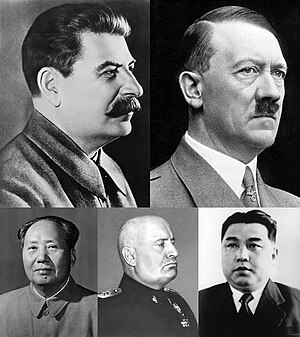ระบบรวบอำนาจเบ็ดเสร็จ
ระบบรวบอำนาจเบ็ดเสร็จ (อังกฤษ: totalitarianism) เป็นระบบการเมืองที่รัฐถืออำนาจเบ็ดเสร็จเหนือสังคมและมุ่งควบคุมทุกแง่มุมของชีวิตสาธารณะและชีวิตส่วนตัวตามที่เห็นจำเป็น[1]

มโนทัศน์ระบบรวบอำนาจเบ็ดเสร็จพัฒนาขึ้นครั้งแรกในความหมายเชิงบวกในคริสต์ทศวรรษ 1920 โดยฟาสซิสต์อิตาลี มโนทัศน์ดังกล่าวกลายมาโดดเด่นในวจนิพนธ์การเมืองต่อต้านคอมมิวนิสต์ของตะวันตกระหว่างสงครามเย็น เพื่อเน้นความคล้ายที่รับรู้ระหว่างนาซีเยอรมนีและระบอบฟาสซิสต์อื่นด้านหนึ่ง กับคอมมิวนิสต์โซเวียตอีกด้านหนึ่ง[2][3][4][5][6]
ศัพทมูลวิทยา
แก้ความคิด "ระบบรวบอำนาจเบ็ดเสร็จ" อำนาจทางการเมือง "เบ็ดเสร็จ" โดยรัฐเกิดขึ้นใน ค.ศ. 1923 โดย จีโอวันนี อาเมนโดลา ผู้อธิบายฟาสซิสต์อิตาลีว่าเป็นระบบที่แก่นแตกต่างจากเผด็จการตามปกติ[7] ภายหลังคำนี้ถูกให้ความหมายบวกในงานเขียนของจีโอวันนี เจนตีเล นักปรัชญาที่โดดเด่นที่สุดของอิตาลีและนักทฤษฎีฟาสซิสต์ชั้นแนวหน้า เขาใช้คำว่า "totalitario" หมายถึง โครงสร้างและเป้าหมายของรัฐใหม่ รัฐใหม่มีเพื่อ "การเป็นผู้แทนอย่างสมบูรณ์ของชาติ และคำแนะนำเป้าหมายแห่งชาติเบ็ดเสร็จ"[8] เขาอธิบายว่า ระบบรวบอำนาจเบ็ดเสร็จเป็นอุดมการณ์ที่รัฐอยู่เหนือพลเมืองส่วนใหญ่ของตน ถ้าไม่ใช่ในทางอำนาจแล้ว ก็ในทางอิทธิพล[9] เบนิโต มุสโสลินีกล่าวว่า ระบบนี้ใส่ความเป็นการเมืองแก่ทุกสิ่งที่เป็นจิตวิญญาณและเป็นมนุษย์
ทุกอย่างอยู่ภายใต้รัฐ ไม่มีสิ่งใดอยู่นอกเหนือรัฐ ไม่มีสิ่งใดขัดขวางรัฐได้[7]
ผู้นำสูงสุด
แก้- อะเลคซันดร์ คอลชัค (ผู้ปกครองสูงสุด) ในรัสเซีย
- อดอล์ฟ ฮิตเลอร์ (ฟือเรอร์) ในเยอรมนี
- เบนิโต มุสโสลินี (ดูเช) ในอิตาลี
- จักรพรรดิฮิโระฮิโตะ (เท็นโน) ในญี่ปุ่น
- โจเซฟ สตาลิน (Vozhd) ในสหภาพโซเวียต
- เอียน อันโตเนสคู (คอนดูคาเตอ) ในโรมาเนีย
- ฟรันซิสโก ฟรังโก (เกาดีโญ) ในสเปน
- อานเต ปาเวลิช (โพกลาฟนิก) ในโครเอเชีย
- แฟแร็นตส์ ซาลอชี (Nemzetvezető) ในฮังการี
- ยอเซ็ฟ ติซอ (Vodca) ในสโลวาเกีย
- วิดกึน ควิสลิง (Fører) ในนอร์เวย์
- ผู้นำสูงสุดของเกาหลีเหนือ
- ผู้นำทรงอำนาจสูงสุดของจีน
- เลขาธิการพรรคคอมมิวนิสต์ในรัฐคอมมิวนิสต์
- ผู้นำสูงสุดอิหร่าน
- ผู้นำสูงสุดอัฟกานิสถาน[10]
อ้างอิง
แก้- ↑ Robert ConquestReflections on a Ravaged Century (2000) ISBN 0-393-04818-7, page 74
- ↑ Andrew Defty, Britain, America and Anti-Communist Propaganda 1945-1953: The Information Research Department, 2007, chapters 2-5
- ↑ Achim Siegel, The totalitarian paradigm after the end of Communism: towards a theoretical reassessment, 1998, page 200 "Concepts of totalitarianism became most widespread at the height of the Cold War. Since the late 1940s, especially since the Korean War, they were condensed into a far-reaching, even hegemonic, ideology, by which the political elites of the Western world tried to explain and even to justify the Cold War constellation"
- ↑ Nicholas Guilhot, The democracy makers: human rights and international order, 2005, page 33 "The opposition between the West and Soviet totalitarianism was often presented as an opposition both moral and epistemological between truth and falsehood. The democratic, social, and economic credentials of the Soviet Union were typically seen as "lies" and as the product of a deliberate and multiform propaganda...In this context, the concept of totalitarianism was itself an asset. As it made possible the conversion of prewar anti-fascism into postwar anti-communism
- ↑ David Caute, Politics and the novel during the Cold War, 2009, pages 95-99
- ↑ George A Reisch, How the Cold War transformed philosophy of science: to the icy slopes of logic, 2005, pages 153-154
- ↑ 7.0 7.1 Pipes 1995, pp. 240–281
- ↑ Stanley G. Payne, Fascism: Comparison and Definition (UW Press, 1980), porn. 73
- ↑ G. Gentile & B. Mussolini in "La dottrina del fascismo" (1932)
- ↑ *Sakhi, Nilofar (December 2022). "The Taliban Takeover in Afghanistan and Security Paradox". Journal of Asian Security and International Affairs. 9 (3): 383–401. doi:10.1177/23477970221130882. S2CID 253945821.
Afghanistan is now controlled by a militant group that operates out of a totalitarian ideology.
- Madadi, Sayed (6 September 2022). "Dysfunctional centralization and growing fragility under Taliban rule". Middle East Institute. สืบค้นเมื่อ 28 November 2022.
In other words, the centralized political and governance institutions of the former republic were unaccountable enough that they now comfortably accommodate the totalitarian objectives of the Taliban without giving the people any chance to resist peacefully.
- Sadr, Omar (23 March 2022). "Afghanistan's Public Intellectuals Fail to Denounce the Taliban". Fair Observer. สืบค้นเมื่อ 28 November 2022.
The Taliban government currently installed in Afghanistan is not simply another dictatorship. By all standards, it is a totalitarian regime.
- "Dismantlement of the Taliban regime is the only way forward for Afghanistan". Atlantic Council. 8 September 2022. สืบค้นเมื่อ 28 November 2022.
As with any other ideological movement, the Taliban’s Islamic government is transformative and totalitarian in nature.
- Akbari, Farkhondeh (7 March 2022). "The Risks Facing Hazaras in Taliban-ruled Afghanistan". George Washington University. คลังข้อมูลเก่าเก็บจากแหล่งเดิมเมื่อ 2023-01-14. สืบค้นเมื่อ 28 November 2022.
In the Taliban’s totalitarian Islamic Emirate of Afghanistan, there is no meaningful political inclusivity or representation for Hazaras at any level.
- Madadi, Sayed (6 September 2022). "Dysfunctional centralization and growing fragility under Taliban rule". Middle East Institute. สืบค้นเมื่อ 28 November 2022.